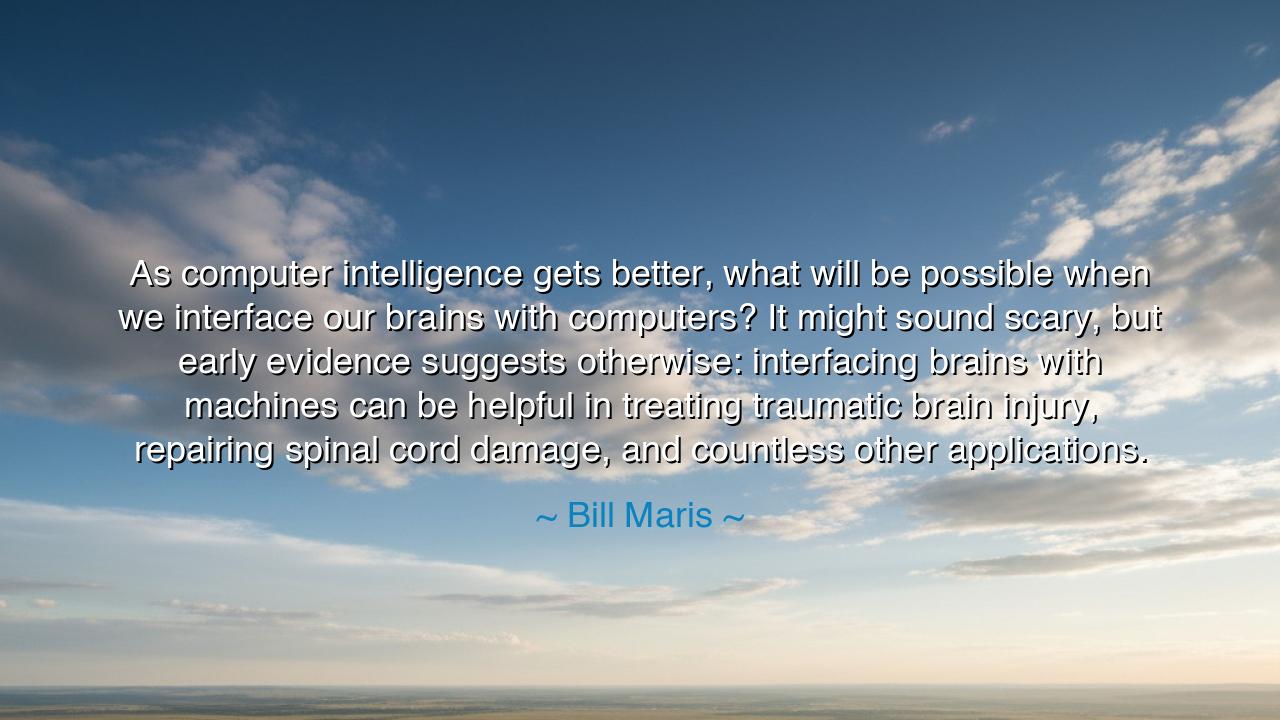
As computer intelligence gets better, what will be possible when
As computer intelligence gets better, what will be possible when we interface our brains with computers? It might sound scary, but early evidence suggests otherwise: interfacing brains with machines can be helpful in treating traumatic brain injury, repairing spinal cord damage, and countless other applications.






In the ever-turning story of humankind, there comes a moment when flesh and metal meet—not in battle, but in harmony. It is to this dawning age that Bill Maris speaks when he proclaims, “As computer intelligence gets better, what will be possible when we interface our brains with computers? It might sound scary, but early evidence suggests otherwise: interfacing brains with machines can be helpful in treating traumatic brain injury, repairing spinal cord damage, and countless other applications.” These words carry both the tremor of awe and the calm of faith. They call upon us to see not only the terror of the unknown but the miracle of what may come when humanity and technology unite for healing rather than dominion.
In this quote lies a question as old as fire itself: Can that which we create become an extension of ourselves, or will it consume us? The ancients once feared the forge, thinking metal to be the domain of gods. Yet from that forge came the plow, the sword, and the wheel—tools that shaped civilization. So too, today, we fear the rise of artificial intelligence and the interfacing of mind and machine, imagining it as a threat to our essence. But Maris reminds us that fear, when guided by wisdom, need not become rejection. The union of brain and machine may not be a chain—it may be a bridge.
Already, in our time, the wonders of this new alliance have begun to unfold. There is the story of Jan Scheuermann, a woman once paralyzed from the neck down. Through the power of a brain-computer interface, she was able to move a robotic arm with her thoughts alone. For the first time in years, she fed herself a piece of chocolate, smiling through tears. What the body had forgotten, the mind remembered. And through the language of machines, her will found motion again. Such miracles are no myth—they are proof that technology, when guided by compassion, can restore the broken harmony of body and soul.
Yet there is wisdom in the tremor of Maris’s words when he says, “It might sound scary.” For indeed, the path of progress is always shadowed by peril. To merge the human brain with computers is to walk a road of immense power, and power demands restraint. The ancients knew this truth well. Prometheus brought fire to mankind, but in doing so, he defied the gods and bore the cost. The lesson is not to reject fire, but to wield it with reverence. So too must we approach the fusion of man and machine—with courage tempered by conscience.
The interface of mind and technology is more than invention—it is a reflection of the eternal longing of humanity to transcend its limits. From the first cave painting to the telescope, from the quill to the quantum chip, every tool we have ever made is a mirror of our desire to reach beyond ourselves. And now, as the boundary between thought and mechanism begins to dissolve, we must ask not only what we can create, but who we will become.
The words of Maris call us, then, not to fear, but to responsibility. Let this new age be guided not by greed for power, but by reverence for life. Let science and ethics walk hand in hand, as the sun and moon share the same sky. For if we marry the intelligence of machines with the compassion of the human heart, we may heal what once seemed impossible to mend—not only the spine or the brain, but the divisions of our world.
And so, to those who stand at the threshold of the future, take this lesson: do not turn away from the unknown in fear, nor run toward it in reckless haste. Instead, approach it as the ancients approached the temple—with humility, curiosity, and wonder. The interface of brain and computer is not merely a merging of circuits and cells—it is the next verse in the hymn of creation. Use it not to dominate, but to heal; not to escape humanity, but to deepen it. For the greatest technology we shall ever wield is not the machine—it is the wisdom to use it well.






AAdministratorAdministrator
Welcome, honored guests. Please leave a comment, we will respond soon